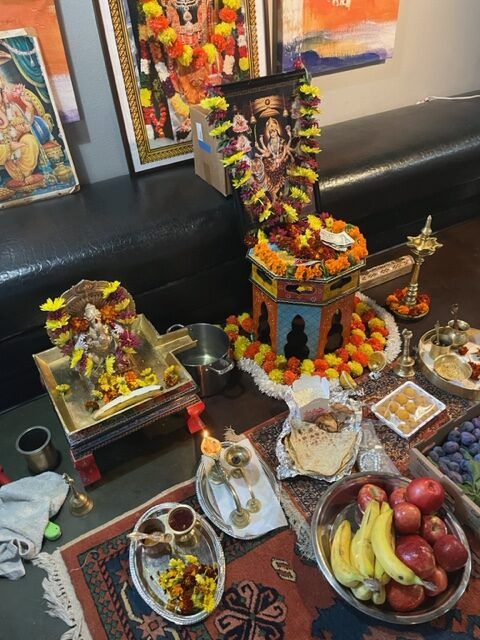Spokane Hindu Temple brings community together to celebrate the divine feminine with Navratri Festival
News Story by Mia Gallegos | FāVS News
On Sunday, the Spokane Hindu Temple and Cultural Center held its Navratri festival, a celebration to honor the Divine Feminine energy or Devi. Navratri is celebrated four times a year at the changing of each of the seasons.
Hindus throughout the world celebrate Navratri for different periods of time. The direct translation for the festival is “nine nights,” which is the duration of the festival here in Spokane, ranging from Oct. 3 through Oct. 12.

The celebration on Sunday encompassed several elements, including a traditional Hindu ceremony and gift offering to the Lord Ganesha. This ceremony, referred to as puja, was not specific to the holiday and can be performed outside of the temple by practicing Hindus.
“Anyone can perform that type of ceremony in their homes, and many do,” Chellappa Deva said, one of the two men who performed puja for the festival. “By doing the chants, we’re asking (Ganesha’s and Devi’s) presence to come down and hover over us.”
Within the puja, there is the lighting of incense, offering of flowers, food and other ceremonial gestures and chants to honor this high power and invite the presence to bless those in attendance. The majority of the ceremony was said in Sanskrit, while many of the chants were in Hindi.
Sree Nandagopal, one of the attendees at Navratri, explained how switching between these dialects comes at no difficulty to her and most of the others at the ceremony.
“We’ve been practicing this since we were born,” Nandagopal said. “It comes very naturally because it’s been our whole lives.”
Food and fellowship
The Hindu Temple in Spokane is a small and transient community, Deva said. Many people come and go, but the tight-knit nature of the attendees at Navratri is evident.
Most if not all of the members of the temple who came to Navratri brought a dish for sharing. This was for after the first part of the celebration concluded.
“All of the puja’s have food, even if it’s just a little bit,” Himani Agrawal said, the woman who managed many of the logistical tasks for Navratri and the temple as a whole. “But for big festivals like this, everyone contributes something and we have a big feast.”
After the conclusion of the meal, the women and children and several of the men joined together to take part in a traditional dance called Garba. This dance originated in the state of Gujarat, India, the place where Mahatma Gandhi was born. This dance involved several different songs. It also included Dandiya sticks that were hit against one another in a self-made percussive ensemble.
Manish Gupta, Agrawal’s husband, explained how the festival is celebrated in different ways throughout the world.
“The celebration changes based on the region but the meaning and focus is the same,” Gupta said. The focal point being the reverence and admiration that is expressed through varying means for Devi and her dynamic nature.
‘Her role and her power’
Agrawal explained her love for Navratri and appreciation for the centuries-old attention that Hinduism pays to the importance of women.
“This religion is 5,000 years old, but they recognized that women are central to society,” Agrawal said. “We are talking about women empowerment for thousands of years.”
Agrawal explained how the worshiping of Devi is also the acknowledgement of the different forms that women can take. From being that beautiful being who maintains the balance of family to those other times when she may need to defend herself or her loved ones.
“To me that is the most important thing: the woman, her role and her power,” Agrawal said.
On Saturday, Oct. 12, the Spokane India Community will host a Garba Night from 11 a.m. to 9 p.m. at the Spokane Valley Mall. This celebration will mark the conclusion of this Navratri until the next celebration at the start of 2025.






